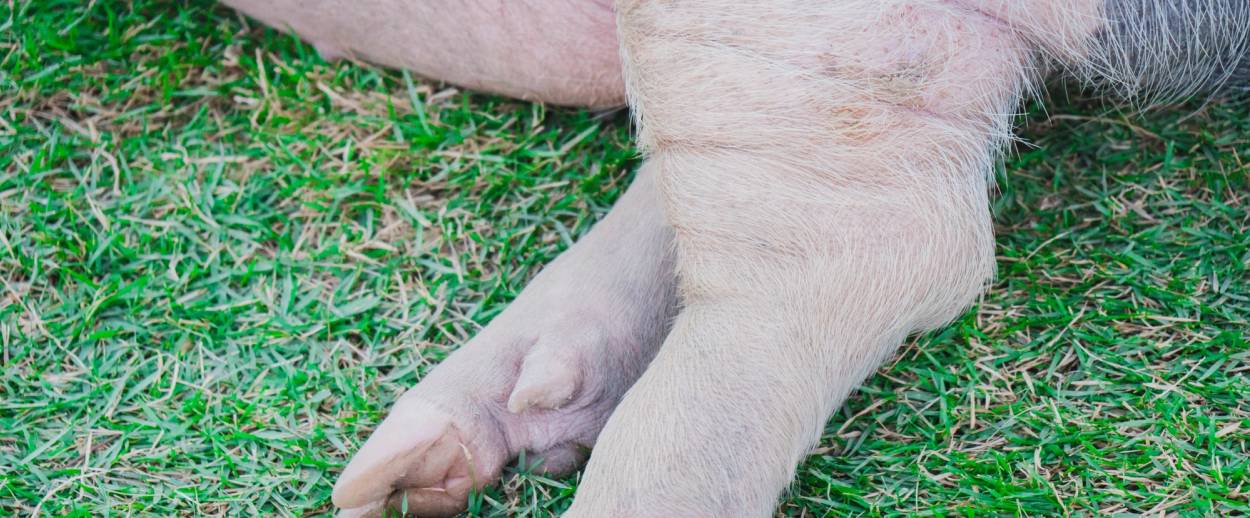In Yiddish, Putting Your Best Foot Forward
Unless, of course, you’re a pig




“Impeach” is a word that has apparently been on some lips (and in some dreams) over the past year or so. The Yiddish word for bringing a public official before a tribunal to face an accusation of misconduct is, well, impeach. As in: “Halevai ehr vet zayn impeached. (Halevai” meaning, “if only”; “ehr” meaning “he”; “vet zayn,” “will be”).
Which brings to mind the old yarn about two American Jews who were wondering how one says “disappointed” in Yiddish. Irwin announces that he’ll find out from his immigrant mother, who speaks only Yiddish and lives in another city.
So he calls her up and says in Yiddish: “Ma, how would you feel if Sheila and I said we’re coming to visit with the kids and you prepared a brisket, potato kugel and tzimmes for us, but then I called and said something came up and we needed to postpone the visit.
“Oy,” Ma responds, despondency audible in her voice. “Ich volt geven zeyer…”–“I would be very…”–“deezappointed.”
As it happens, there is in fact a Yiddish word for “disappointed,” namely entoisht, from the German enttäuscht, meaning precisely that. None, though, at least that I know of, for “impeached.”
That latter English word, interestingly, is rooted in the Latin impedicare, “to fetter or catch” (yielding, of course, “impediment”), based on the Latin pedica, “shackle,” itself from from pes, “foot.”
Which brings us back to Yiddish, specifically to “foos,” the word for “foot” (plural: fees), derived from that same Latin word. (Yes, readers of a certain age with memories of low-tech entertainment, “foosball” comes from the German word for football, i.e. soccer, namely fußball.)
A number of Yiddish phrases (and most Jewish bodies) include fees or foos. Like foosgeyer, or “foot-goer,” i.e. a pedestrian. And achtfus, “eight-footer,” that is to say, an octopus (or, perhaps, Manute Bol).
A dreifus, or “three-legger,” can refer to either a tripod or three-legged cooking pot.
An intriguing Yiddish phrase utilizing the diminutive word for foot, fisl (“footsie,” one might say), is aroysshtelen a koshereh chazerfissl. “to stick out a little kosher pig foot.” Therein, as you might surmise, lies a tale.
The Torah forbids the Jewish consumption of animals unless they chew their cud and have split hooves. Two examples of animals that have one kosher sign but not the other are the camel (which regurgitates and re-swallows its food but lacks the requisite hooves) and the pig, which has the right feet but the wrong digestive practice.
And so, a pig is imagined by the Talmud as trying to present its kosher bona fides by stretching out its impressive little split-hooves for inspection, to try to mislead Jewish carnivores.
Thus, the phrase is used to connote someone who seeks to mislead by showing off something impressive, although it does not really reflect who he in fact is.
A similar phrase is used to describe a brazen braggart: Barimen zich vi der chazer mit zayn fisl–“to boast like a pig with his little foot.”
Offensive, to be sure. But, unfortunately, not in itself an impeachable offense.
Rabbi Shafran, whose latest book is “It’s All In The Angle” (Judaica Press), blogs at rabbiavishafran.com.